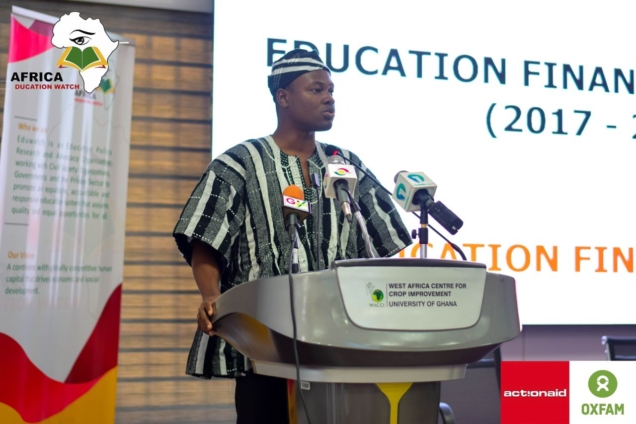As the 2024 elections approach, civil society organisations are intensifying their calls for greater transparency and accountability in the education sector.
Africa Education Watch (EduWatch), supported by Oxfam and ActionAid, recently hosted its Annual Education Financing Conference to present a comprehensive report on education financing from 2017 to 2024.
The conference, held on August 29, 2024, at the West Africa Centre for Crop Improvement (WACCI) at the University of Ghana, highlighted the urgent need for stronger financial commitment and effective allocation of resources in the education sector.
The report critically evaluates the government's financial contributions to education over the past seven years, comparing them to international standards.
Divine Kpe, Snr Programme Officer of Eduwatch noted that GDP allocation between 2014-2024 is averagely 4% while the percentage of total annual expenditure is averagely 7%.
He pointed out that while the 4% allocation meets the lower threshold, it remains inadequate for addressing the sector's needs, urging the government to aim for the higher end of the benchmark to ensure sufficient funding.
Budget credibility also emerged as a significant concern.
Mr Kpe explained that although budget allocations for initiatives like the Free Senior High School (FSHS) program and capitation grants may seem adequate on paper, actual disbursements often fall short.
He noted that the FSHS program's budget credibility has decreased from 120% in its initial year to just 61% recently.
“The feeding grant for special schools has also faced delays, and it is crucial to highlight these issues to ensure that attention is directed toward resolving them,” he added.
The report also criticised the government’s funding approach for Technical, Vocational, Education, and Training (TVET), which receives only about 8% of total education expenditure.
Mr Kpe called for a distinct financing model for TVET to address its capital-intensive nature and improve practical training and enrollment.
“To effectively support TVET, we cannot apply the same financing model used for the FSHS program,” he said.
“There is a pressing need for a dedicated financing model for TVET to tackle its unique challenges and enhance the quality of technical education in Ghana.”
Latest Stories
-
I want to focus more on my education – Chidimma Adetshina quits pageantry
2 hours -
Priest replaced after Sabrina Carpenter shoots music video in his church
2 hours -
Duct-taped banana artwork sells for $6.2m in NYC
2 hours -
Arrest warrants issued for Netanyahu, Gallant and Hamas commander over alleged war crimes
2 hours -
Actors Jonathan Majors and Meagan Good are engaged
3 hours -
Expired rice saga: A ‘best before date’ can be extended – Food and Agriculture Engineer
3 hours -
Why I rejected Range Rover gift from a man – Tiwa Savage
3 hours -
KNUST Engineering College honours Telecel Ghana CEO at Alumni Excellence Awards
3 hours -
Postecoglou backs Bentancur appeal after ‘mistake’
3 hours -
#Manifesto debate: NDC to enact and pass National Climate Law – Prof Klutse
4 hours -
‘Everything a manager could wish for’ – Guardiola signs new deal
4 hours -
TEWU suspends strike after NLC directive, urges swift resolution of grievances
4 hours -
Netflix debuts Grain Media’s explosive film
4 hours -
‘Expired’ rice scandal: FDA is complicit; top officials must be fired – Ablakwa
5 hours -
#TheManifestoDebate: We’ll provide potable water, expand water distribution network – NDC
5 hours

